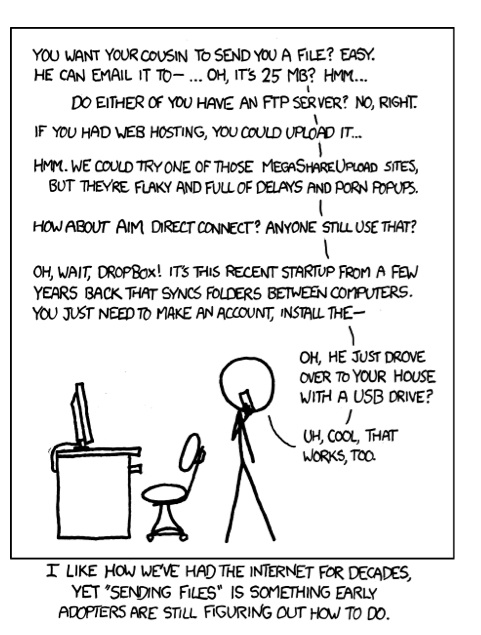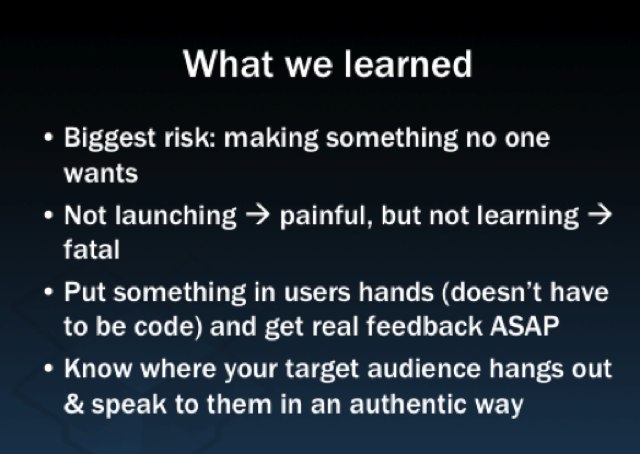Editor’s note: Guest contributor Eric Ries is a consultant and the author of The Lean Startup.
Drew Houston is featured on the cover of Forbes magazine as the entrepreneur who out-Steve Jobs’ed Steve Jobs. He just raised $250 million for DropBox (as he explains in this TCTV interview). His success is well-earned, as Dropbox continues to earn its reputation as one of Silicon Valley’s hottest companies.
But what these stories tend to leave out is that Drew has spent years doing the unglamorous work building not just a great product, but a great company. I’ve been happy to host him at the past two Startup Lessons Learned conferences, where he’s shared candidly the lessons he’s learned along the way. One of the techniques he used to validate the concept for Dropbox is so powerful – and so simple – that most entrepreneurs overlook it. It’s an example of building a minimum viable product (MVP). I call it the Dropbox MVP, in Drew’s honor, and I devoted a section of my new book (The Lean Startup: How Today’s Entrepreneurs Use Continuous Innovation to Create Radically Successful Businesses) to it, which you can read below.
I’ve also included links to slides & video below to Drew’s two presentations at sllconf 2010 and 2011. They are both a must-watch for any aspiring tech entrepreneur.
A minimum viable product (MVP) helps entrepreneurs start the process of learning as quickly as possible. It is not necessarily the smallest product imaginable, though; it is simply the fastest way to start learning how to build a sustainable business with the minimum amount of effort.
Contrary to traditional product development, which usually involves a long, thoughtful incubation period and strives for product perfection, the goal of the MVP is to begin the process of learning, not end it. Unlike a prototype or concept test, an MVP is designed not just to answer product design or technical questions. Its goal is to test fundamental business hypotheses.
The lesson of the MVP is that any additional work beyond what was required to start learning is waste, no matter how important it might have seemed at the time.
The Dropbox MVP
Drew Houston is the CEO of Dropbox, a Silicon Valley company that makes an extremely easy-to-use file-sharing tool. Install its application, and a Dropbox folder appears on your computer desktop. Anything you drag into that folder is uploaded automatically to the Dropbox service and then instantly replicated across all your computers and devices.

The founding team was made up of engineers, as the product demanded significant technical expertise to build. It required, for example, integration with a variety of computer platforms and operating systems: Windows, Macintosh, iPhone, Android, and so on. Each of these implementations happens at a deep level of the system and requires specialized know- how to make the user experience exceptional. In fact, one of Dropbox’s biggest competitive advantages is that the product works in such a seamless way that the competition struggles to emulate it.
These are not the kind of people one would think of as marketing geniuses. In fact, none of them had ever worked in a marketing job. They had prominent venture capital backers and could have been expected to apply the standard engineering thinking to building the business: build it and they will come. But Dropbox did something different.
In parallel with their product development efforts, the founders wanted feedback from customers about what really mattered to them. In particular, Dropbox needed to test its leap- of- faith question: if we can provide a superior customer experience, will people give our product a try? They believed—rightly, as it turned out—that file synchronization was a problem that most people didn’t know they had. Once you experience the solution, you can’t imagine how you ever lived without it.
This is not the kind of entrepreneurial question you can ask or expect an answer to in a focus group. Customers often don’t know what they want, and they often had a hard time understanding Dropbox when the concept was explained. Houston learned this the hard way when he tried to raise venture capital. In meeting after meeting, investors would explain that this “market space” was crowded with existing products, none of them had made very much money, and the problem wasn’t a very important one. Drew would ask: “Have you personally tried those other products?” When they would say yes, he’d ask: “Did they work seamlessly for you?” The answer was almost always no. Yet in meeting after meeting, the venture capitalists could not imagine a world in line with Drew’s vision. Drew, in contrast, believed that if the software “just worked like magic,” customers would flock to it.
The challenge was that it was impossible to demonstrate the working software in a prototype form. The product required that they overcome significant technical hurdles; it also had an online service component that required high reliability and availability. To avoid the risk of waking up after years of development with a product nobody wanted, Drew did something unexpectedly easy: he made a video.
The video is banal, a simple three- minute demonstration of the technology as it is meant to work, but it was targeted at a community of technology early adopters. Drew narrates the video personally, and as he’s narrating, the viewer is watching his screen. As he describes the kinds of files he’d like to synchronize, the viewer can watch his mouse manipulate his computer. Of course, if you’re paying attention, you start to notice that the files he’s moving around are full of in- jokes and humorous references that were appreciated by this community of early adopters.
Drew recounted, “It drove hundreds of thousands of people to the website. Our beta waiting list went from 5,000 people to 75,000 people literally overnight. It totally blew us away.”
“To the casual observer, the Dropbox demo video looked like a normal product demonstration,” Drew says, “but we put in about a dozen Easter eggs that were tailored for the Digg audience. References to Tay Zonday and ‘Chocolate Rain’ and allusions to Office Space and XKCD. It was a tongue- in- cheek nod to that crowd, and it kicked off a chain reaction. Within 24 hours, the video had more than 10,000 Diggs.”
(You can watch the original video here: http://answers.oreilly.com/topic/1372-marketing-lessons-from-dropbox-a-qa-with-ceo-drew-houston/ and see the original reaction from the Digg community here: http://digg.com/software/Google_Drive_killer_coming_from_MIT_Startup.)
In this case, the video was the minimum viable product. The MVP validated Drew’s leap- of- faith assumption that customers wanted the product he was developing not because they said so in a focus group or because of a hopeful analogy to another business, but because they actually signed up.
At Startup Lessons Learned 2010, Drew summed up his experience with this single slide:

And here are both of Drew’s presentations:































Comment